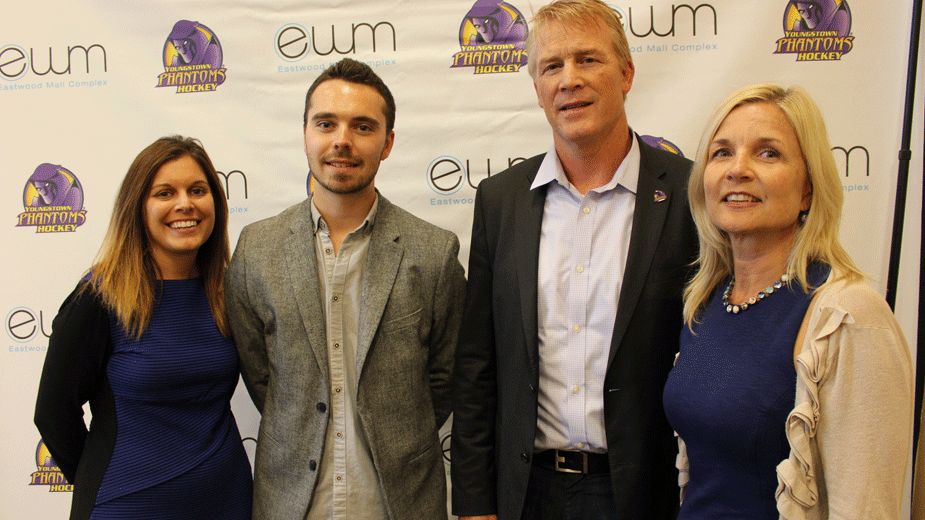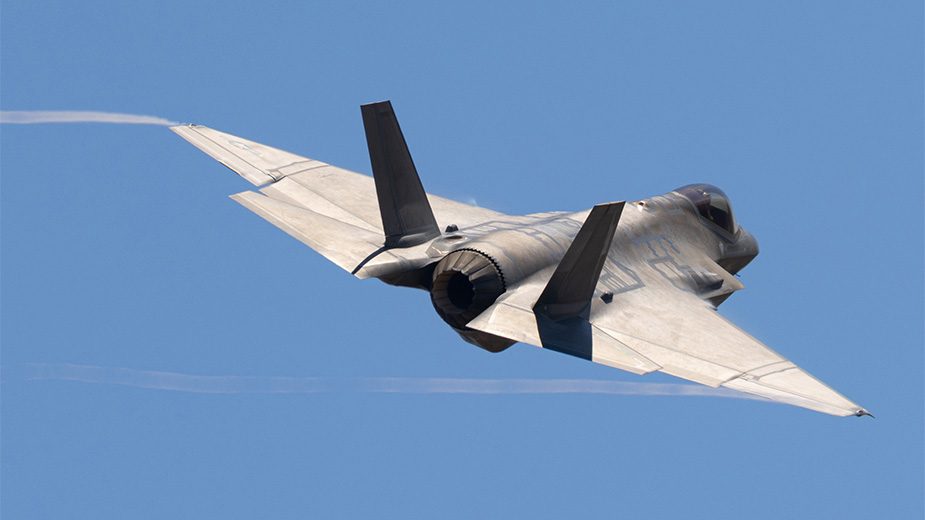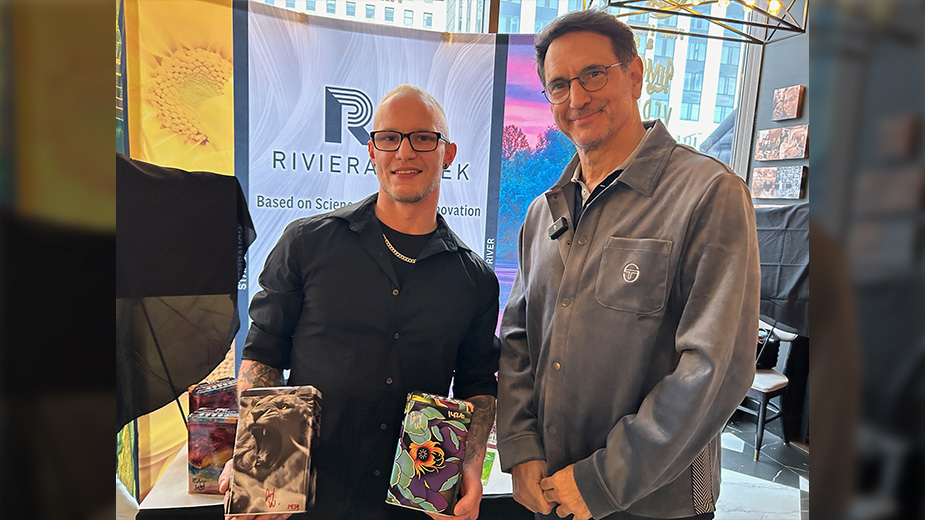Phantoms’ Front Office Drives for Profit Goals
YOUNGSTOWN, Ohio — With the start of the season fast approaching, the flurry of activity in the Youngstown Phantoms front office is beginning to calm down. All the players have been signed, sponsorship deals are complete and the promotions planned.
At this point in the year, the focus begins to shift from the macro level to the team’s day-to-day operations. There isn’t much left to do except play hockey.
“During the season you’re in game mode, thinking about who’s coming out, selling tickets and putting on a good production,” says co-owner Troy Loney. “Then there’s the actual hockey stuff that sits alongside all that, and has to be running at the same time.”
There’s a rhythm to the regular season, Loney explains. The offseason, though, can be a completely different beast, one that requires intensive planning and much forethought.
“You’re doing your scheduling, planning promotions, talking to sponsors, talking to the ticket base, talking to fans and trying to understand everything that you have coming up for the year,” he continues.
The logistics of the season must be considered as well, he says, which often means planning road trips months in advance – everything from booking hotels to chartering buses – and figuring when equipment should be ordered. A new shipment of sticks does a player no good if they’re delivered to the Covelli Centre when he’s in Dubuque, Iowa.
It’s the planning during the offseason, from mid-April to the end of September, that keeps the Phantoms’ front office driving toward the goal.
“I’m thinking about development. I’m thinking about what we can do differently in the new year, about what we can do next,” says co-owner Aafke Loney. “What we’re working on this year is our three C’s: creativity, communication and consistency. We want to have the idea development and everyone understand what we’re trying to do.”
Shortly after the season ends, the entire Phantoms staff spends a day brainstorming on how the team and fan experience can be improved. It’s these meetings that have led to promotion mainstays such as Pink in the Rink, Student Day and Military Appreciation Night along with new events such as Mock Election Night and Sci-Fi Night, both of which make their debuts this season.
Once the staff decides to run a promotion, the planning begins. Katie Seminara-DeToro, the team director of marketing and game day operations, says that for Sci-Fi night, several local fan clubs were contacted to gauge their interest in buying group tickets, which come at a discounted rate.
“We reached out the local Starfleet [Star Trek Fan Association], Northeast Ohio Ghostbusters and cosplay groups and some local comic shops,” she says. “It’s about trying to go an extra mile for our fans. We put out an amazing product on the ice, but we also want them to have a complete evening of entertainment.”
Promotions, the Loneys and their staff point out, are part of what fuels the most important source of income for the hockey franchise.
“Ticket sales are the lifeblood of a team,” says Andrew Snyderman, the Phantoms manager of ticket sales. “If we don’t have people in the seats, this team isn’t playing. Everything we do revolves around ticket sales and trying to get people into the Covelli Centre.”
To have a successful team, Troy Loney says, ticket sales need to cover about 80% of a team’s expenses. Last season, the Phantoms averaged about 2,000 fans per game – the season high was around 5,200 – and sold about 200 season tickets, enough for the franchise’s second-highest season attendance ever, behind its inaugural season in 2003.
So far this offseason, Snyderman says, about 300 season ticket packages have been sold, along with 30 “flex packages” that allow fans to buy tickets to 10 games rather than every home game.
The Phantoms also count on walk-up ticket sales, which are heavily analyzed during the offseason to provide more information to potential sponsors, promotion planning and game day operations. It’s not prudent, the ticket manager says, to count on 400 fans buying tickets every night in the hours just before the game.
This season, what could provide a boost is the defending Stanley Cup champion Pittsburgh Penguins and, to a lesser extent, the Calder Cup-winning Cleveland Monsters of the American Hockey League.
The number of people walking through the doors of the Covelli Centre also factor into the Youngstown Phantoms’ second dependable source of income, sponsorships. In the same way a billboard along Market Street in Boardman fetches a higher price than one along state Route 82 in Vienna, teams that draw more fans get more money from sponsors.
“Your sponsorship base always looks at [ticket sales] to figure out how many eyes will be on their product,” Troy Loney says.
This winter, the Phantoms will have a new presenting sponsor in UPMC. Through the deal, UPMC logos will appear on the ice, on the boards, on game programs, in Phantoms’ game advertisements and, for the first time in team history, on patches on the players’ uniforms.
“It’s a relationship we’ve been fostering for years,” he says. “We’ve done some things with UPMC on the training side, which helps the relationship. It was a long process and we’re excited.”
As for other sources of revenue, Seminara-DeToro notes that merchandise sales at games are “another cherry on top of ticket sales.” Concession sales provide little revenue because the Covelli Centre keeps most of the money fans pay for food and drinks.
On the other side of the equation, the Phantoms have to balance spending on front office staff, hockey staff such as coaches, trainers and equipment managers, and game day operations. Because it’s a hockey franchise, considerable attention is paid to what happens on the ice.
What helps the team is that the United States Hockey League, which the Phantoms joined for the 2009-2010 season, is considered an amateur league and players are not paid. Some players, general manager Jason Koehler notes, do come with compensation fees, usually players signed from teams in other countries.
“All Europeans will come with price tag set by the [International Ice Hockey Federation] that’s locked in during the offseason. There are a few leagues in Canada that have something similar,” he explains.
Beyond that, most expenses related to players revolve around scouting and recruiting them to come to Youngstown.
There are no limits about whom the Phantoms can sign, the sole exception being that the Phantoms can have no more than four “import status” players. An import player is one born outside the United States.
“I can pull from Cleveland or California or Canada all the way to Czechoslovakia,” Koehler says, noting that the Phantoms don’t send scouts to watch games in Europe. “We put a lot of time and effort into the United States – because the travel budget to go to games in Canada or Europe, when you can only take four players – you can kill yourself over that budget.”
It’s here that one of the biggest differences between junior hockey and the NHL can be seen. At the top levels, players sign contracts worth millions of dollars that lock them into a team for several years. In the USHL, the bottom tier of hockey in this country, players aren’t paid – equipment and housing are provided, though – and move from team to team. Some go to other junior hockey teams, while others move on to college, play overseas or are drafted by NHL teams and join their affiliates.
“If you’re a quality team, you’re going to turn over half to two-thirds of your roster every year,” Koehler says. “You’d love to have these guys forever considering all the time and effort you put into bringing them in and teaching them. We’d love to have them for 10 years like in pro hockey.”
Of the 33 players on the Phantoms’ roster this season, only seven were on the team last year.
Football is still the No. 1 sport in the Mahoning Valley. But, Troy Loney points out, football was king in Pittsburgh when he arrived with the Penguins in 1986. Hockey was barely on the radar.
“It was probably sport No. 4,” he says.
Then, the Pens won the Stanley Cup in 1991. And again in 1992. Then for a third time in 2009. The team lifted their fourth trophy in June and the victory parade brought an estimated 400,000 fans downtown, some arriving 12 hours early to secure a spot.
There’s no reason, he continues, that the same can’t happen in Youngstown.
“It’s about exposing people to the product,” Loney says. “We think people become fans of this sport once they see it on the ice.”
Pictured: Director of marketing and game day operations Katie Seminara-DeToro, ticket sales manager Andrew Snyderman and co-owners Troy and Aafke Loney lead the team that prepares the Phantoms for the regular season.
Copyright 2024 The Business Journal, Youngstown, Ohio.



